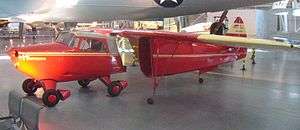Fulton Airphibian
| Airphibian | |
|---|---|
 | |
| Role | Roadable aircraft |
| Manufacturer | Continential Inc |
| Designer | Robert Edison Fulton, Jr. |
| Introduction | 1946 |
| Number built | 4 |
|
| |
The Fulton FA-2 Airphibian was an American roadable aircraft manufactured in 1946.
Development
Designed by Robert Edison Fulton Jr., it was an aluminum-bodied car, built with independent suspension, aircraft-sized wheels, and a six-cylinder 165 hp engine. The fabric wings were easily attached to the fuselage, converting the car into a plane. Four prototypes were built.
In December 1950, the Civil Aeronautics Administration (CAA) (later to become the FAA) certified one of the prototypes and gave it an 1A11 Aircraft Specification, N74104.[1] Lou Achitoff, was the CAA test pilot.[2] The N74154 is the aircraft that is today in the Steven F. Udvar-Hazy Center.
The craft made its debut in November 1946 at Danbury, Connecticut, and they were built in Danbury by Robert Fulton, President; Franz Alverez, VP and Engineer; Ted Polhemus Mechanical and Electrical Master; Frazer Dougherty, Test Pilot; Wayne Dasher (Dash), top flight A&E Mechanic; Fred Underhill, Tool and Die Maker; Ross Stevens, Aeronautical Engineer and Structural Engineer.[3] Financial concerns forced Fulton to sell to a company that never developed it.[4]
Design
The Airphibian took the approach of converting from an aircraft to a roadable vehicle by a conversion process that left aircraft sections behind during road use. The process consisted of removing a three-bladed propeller and placing it on a hook on the side of the fuselage, cranking down support casters, and disengaging lock levers connecting the flight unit to the road unit. The wing and aft fuselage are detached for road use.[5]
Survivors
In the mid-1990s, one of the surviving Airphibians was restored by Fulton III, along with David Dumas and Deborah Hanson. Later, it was put on display for several years at the Canada Aviation Museum in Ottawa, Ontario, Canada in their main display hall, but in 2009 it moved to the Steven F. Udvar-Hazy Center (annex of the National Air and Space Museum).[6]
Specifications
Data from Jane's All The World's Aircraft 1951–52,[7] Smithsonian National Air and Space Museum[8]
General characteristics
- Crew: 2
- Length: 22 ft 2 in (6.76 m)
- Wingspan: 34 ft (10 m)
- Height: 7 ft 8 in (2.34 m)
- Empty weight: 1,500 lb (680 kg)
- Gross weight: 2,100 lb (953 kg)
Performance
- Maximum speed: 120 mph (193 km/h; 104 kn)
- Cruise speed: 110 mph (96 kn; 177 km/h)
- Range: 350 mi (304 nmi; 563 km)
- Service ceiling: 12,000 ft (3,658 m)
- Rate of climb: 600 ft/min (3.0 m/s)
See also
References
- ↑ http://airphibian.com/FAASpecs.htm
- ↑ http://airphibian.com/Danbury2.htm
- ↑ http://airphibian.com/Danbury.htm
- ↑ Martin, Douglas. - New York/Region: "Robert E. Fulton Jr., an Intrepid Inventor, Is Dead at 95". - New York Times. - May 11, 2004. - Retrieved: 2008-06-15
- ↑ Harry Ziesloff (Feb 1957). "The Roadable Airplane". Experimenter.
- ↑ "Collections — Fulton Airphibian FA-3-101". Retrieved 26 September 2011.
- ↑ Bridgman 1951, p. 240c.
- ↑ "Fulton Airphibian FA-3-101". Smithsonian National Air and Space Museum. Retrieved August 31, 2013.
- Bridgman, Leonard. Jane's All The World's Aircraft 1951–52. London: Sampson Low, Marston & Company, Ltd, 1951.
External links
- What Its Like To Fly A Car detailed July 1952 Popular Science article
- Fulton Airphibian
- www.Airphibian.com — a Web site dedicated to the people who designed, built and tested the Airphibian